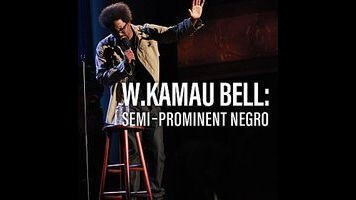In Semi-Prominent Negro, W. Kamau Bell finds the performing confidence to match his wit

In Semi-Prominent Negro, his first stand-up special, W. Kamau Bell wonders how he’s become the go-to black guy for news shows, at least “when Al Sharpton won’t take the phone call.” Bell’s position as one of the perceived black voices in comedy runs throughout the uniformly hilarious set (CNN refers to him as a “political gadfly” in its promos for his upcoming show, United Shades Of America). Bell is all these things. In his short-lived Daily Show-style series, Totally Biased, he presided over a usually sharp selection of the week’s news stories, with his unruly, natural hair, a ready smile, and that oft-imitated Seth Rogen guffaw, his geniality belying an incisive outrage. If Bell seemed a little uncomfortable in front of the camera (and if the writing wore a bit thin after FX put the show on an accelerated production schedule), the quality of his insights buoyed the sometimes ragged presentation.
In the three years since Totally Biased was canceled, Bell’s been working on his comedic presentation, and Semi-Prominent Negro shows how far he’s progressed. Unlike the pinned-to-the-windscreen look that sometimes made his Totally Biased emceeing stiff and uncomfortable, here Bell is loose before an appreciative Brooklyn audience, moving about the stage freely and using his big, lanky body to punctuate material. (He ends with a sexual-political joke that’s especially confident in its physicality.) He still has that endearing, forceful laugh, but as a stand-up, he’s developed a solid conversational flow that makes his trenchant material about politics and race that much more persuasive.
All political comedians have to establish their authority. After all, everyone has opinions. Comics trying to sell theirs need to make a legitimate case that what they have to say is worth listening to. For Bell, the key is not only how clearly presented and reasonable (and sometimes angry) his positions are but also how grounded they are in gratifyingly specific common experience. Granted, by playing to this Brooklyn crowd, no matter how racially diverse it appears to be, Bell isn’t exactly winning over the Klan (something he appears to do in a United Shades Of America preview where he makes a defiant Klan leader laugh). Still, he walks a dexterous line, his obvious intelligence and knowledge couched in so reasonable and sensible (and funny) a point of view as to be irresistible.
It’s easy enough to work from a baseline of “we’re all just people” populism, but Bell tethers his appeals for common sense to specific aspects of both his life and people’s shared experiences. Bell and his white wife—“a doctor of dance and social-political comedian,” he proclaims, mocking the couple’s poor financial standing—have two daughters. Making fun of his lackadaisical approach to choosing the right preschool (“Can’t we just Yelp the closest one? Just scan to see the word ‘molestation’ and keep it moving?”), he relates how the experience opened his eyes to an issue he didn’t know he had. He rejects one touchy-feely, structure-less school, saying, “I don’t know if you noticed, but I’m raising an African American woman baby… She’s starting out way behind.” His observation that such a school is for “white-boy babies, where he can eat paste all day and still be the president” confidently lands the joke about racial inequality on two wheels at once.
Throughout the unflaggingly excellent hour-long set, Bell nails joke after joke just like that. With family issues like his white wife panicking when she realizes that she doesn’t know how to do black women’s hair, Bell delves into the details of his life to reach outward to larger issues of interracial relationships so effortlessly that the only response is grateful laughter. After a funny run about how his wife’s customary diligence means hair time at his house now looks like the most lived-in black barbershop (“Why is there a hot comb on the stove?” “For effect, damn it!”), he reaches out to hug a black woman in the audience doubled over with laughter. As gratifying as Bell’s satirical points are, it’s just as pleasing how he mines shopworn topics like kids and marriage for fresh material.
When Bell approaches the topic of marriage equality, he comes at it from different angles, all of them smart, all of them funny. Teasing his own proud liberalism, he acts out a conversation, in gloriously elaborate detail, explaining gender fluidity to his young daughter. His desire to tell her the truth wars with his discomfort over her ability to process it. (“Since you bring it up, gender… Did they teach you about pronouns yet?”) He expresses the essential rightness of having such “uncomfortable” conversations with a statement of such purity and hopefulness that it’s truly inspiring: “Four-year-olds don’t get magic, because they don’t know enough to be amazed by magic.”
There’s not a weak spot in the set. Bell transitions easily through material about his family (and white in-laws), Berkeley versus New York liberalism (“Hey, I don’t care what faggots do. I’m on the committee to let fag—Nigger, you’re not listening to me!”), the surprising ease with which the Supreme Court ruled in favor of gay marriage (“Don’t we have to go Stonewall on this?” “Nah, we got tired of getting emails from our grandkids”), the 2016 election, prejudice he faces from the black community for being in an interracial relationship, President Obama’s last years in office, and more. He does this all without slowing down or betraying anything but justified, good-natured confidence. When Bell talks about being a sought-after social commentator on cable news, his bewilderment is genuine. But when he relates his one-line response to a white reporter asking his opinion on when it’s okay for a white person to say “nigger,” the pitch-perfect nature of his response testifies to the fact that W. Kamau Bell isn’t going to stay just semi-prominent for much longer.